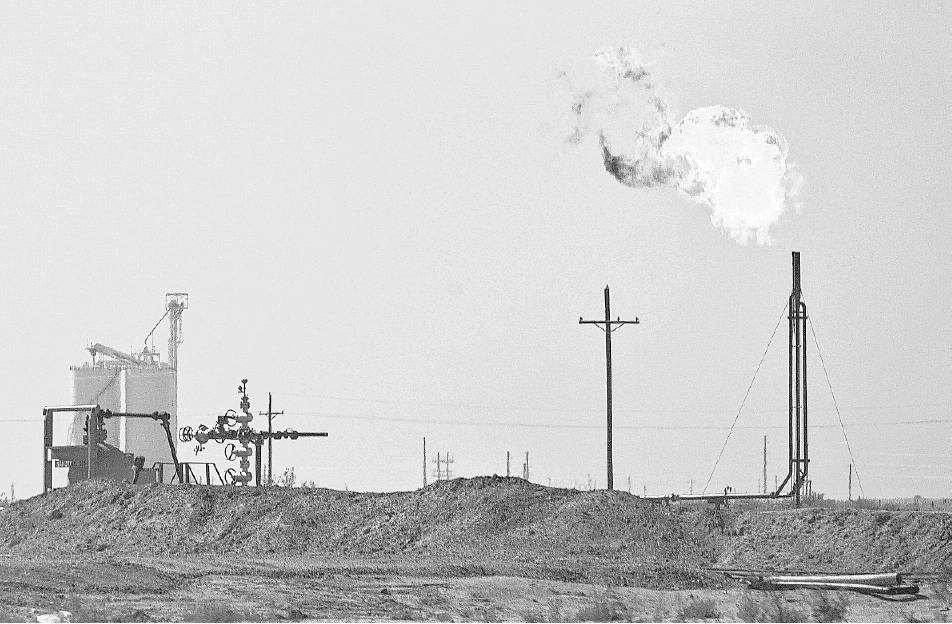EPA set to roll back methane regulations
Trump administration to change rules, even as larger companies support emissions cuts
By James Osborne STAFF WRITER
WASHINGTON — The Trump administration will roll back Obama-era regulations limiting emissions of the potent greenhouse gas methane from oil and gas wells, even as many companies within the industry have made reducing those emissions agoal as part of the effort to slow global warming.
Under a proposed change announced by the Environmental Protection Agency on Thursday, oil and gas companies would no longer be required to inspect for methane leaks from existing wells, storage tanks, pipelines and other infrastructure.
The action “removes unnecessary and duplicative regulatory burdens from the oil and gas industry,” EPA Administrator Andrew Wheeler said. “The Trump administration recognizes that methane is valuable, and the industry has an incentive to minimize leaks and maximize its use.”
U.S. methane emissions have steadily fallen since the 1990s, as oil and gas companies worked to minimize losses of natural gas during both oil and gas production through equipment leaks or improperly drilled wells. But considering methane’s outsize role in climate change — it’s 25 times more powerful than carbon dioxide — the Obama administration reasoned the industry needed to move faster.
The rule change marks the latest effort by President Donald Trump to pull back regulations designed to fight climate change, which scientists predict will grow increasingly severe in the decades ahead without a drastic reduction in global emissions. Environmental groups already are preparing lawsuits, likely setting up a years-long legal fight over the federal government’s obligation to reduce greenhouse gas emissions
“The Trump EPA is eager to give the oil and gas industry a free pass to keep leaking enormous amounts of climate pollution into the air,” said David Doniger, an attorney at the Natural Resources Defense Council. “If EPA moves forward with this reckless and sinister proposal, we will see them in court.”
Methane remains a divisive topic within the oil and gas industry, with larger companies including Exxon Mobil, BP and Royal Dutch Shell voluntarily pledging to reduce methane emissions in the decade ahead.
Both BP and Shell released statements questioning the decision to roll back methane regulations.
“BP has been clear in its position that EPA should directly regulate methane emissions from new and existing sources,” said Susan Dio, chair of BP America. “We believe this is the most effective way to protect the environment and maximize the benefits of natural gas.”
But for smaller oil and gas companies, many of which count fewer than a dozen employees, the requirement that they inspect individual wells with infrared cameras is too onerous, said Lee Fuller, vice president of government affairs at the Independent Petroleum Association of America. Infrared cameras reveal methane emissions, which aren’t visible to the naked eye.
Most affected are so-called stripper wells, which produce less than 10 barrels of crude a day and make up about 80 percent of U.S. wells, he added.
“(Obama’s rule) threatens to shut down all those wells,” Fuller said, “and that’s clearly been the goal of the environmental community through this process.”
For the tens of thousands of new oil and gas wells drilled or modified each year, not much is expected to change — at least for now. A 2012 rule designed to reduce ozone pollution remains on the books, requiring drillers to seek escaping natural gas — of which methane is the primary component — and either store it or flare it.
With time, that rule is expected to require emissions inspections of most U.S. wells.
“Eventually that’s going to get everything,” said Erik Milito, a vice president at the American Petroleum Institute, the industry trade and lobbying group. “It makes more sense instead of blanketing everything when a lot of those (existing) wells are going to go out of production anyway.”
The EPA is amending those ozone regulations, too, as oil lobbyists argue the required inspections are too frequent and don’t allow them to survey large numbers of wells at once with drones or other airborne craft equipped with methane detectors. james.osborne@chron.com twitter.com/osborneja
